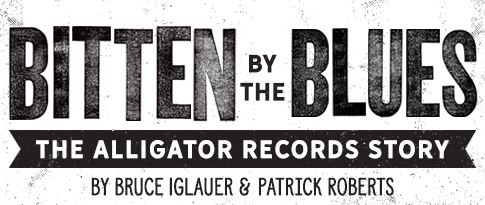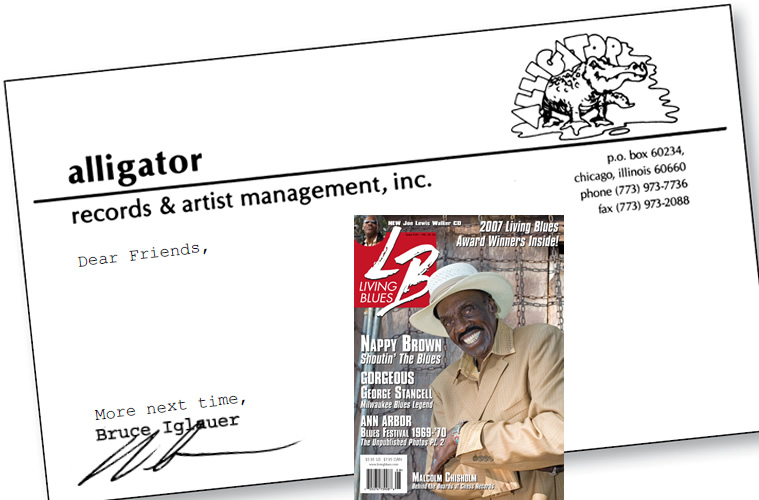Dear Friends,
A big chunk of sorrow for my world on May 6, when my old pal Carey Bell died. I had known Carey since 1969, when we met at Bob Koester’s Jazz Record Mart during one of my early Chicago blues expeditions. Carey had just cut his debut for Bob’s Delmark label, announcing the emergence of a new blues harp master. I liked Carey from the start; he was a sweet, gentle guy who had come up from Mississippi in the 1950s but never really lost his country ways. He seemed like a big kid, honestly pleased and surprised that people enjoyed his music, with no sign of any ego. Even before I started Alligator, Carey and I developed a special bond. Once on West Madison Street, outside of the well-named Johnny Do-Wrong’s club, he rescued me from a very scary group of gangbangers. Carey ran them off with a big tire iron, and may have literally saved my life.
When I founded Alligator, one of my dreams was to record Carey’s harmonica mentor, the great Big Walter Horton, my favorite harp player of all time. I had seen the two of them play some amazing duets at Florence’s Lounge one Sunday afternoon. So when I got ready to record Walter (for the second Alligator album ever), I asked Carey to help me out. In the studio, Carey’s constant good-natured challenges pushed Walter to some of his best performances, and we caught a couple of those terrific harp duets on the album, Big Walter Horton with Carey Bell. When I planned the Living Chicago Blues series in 1977, to feature lesser known and under-recorded artists, Carey was one of the bluesmen I chose immediately. For the session, Carey brought his teenage son Lurrie to play guitar, and I got my first hint of what a monster talent Lurrie would become.
Carey recorded for a lot of labels over the years, including his appearance on our epic 1990 Harp Attack! super-session with his friends James Cotton, Junior Wells and Billy Branch. We cut two albums with Carey that he considered the best of his career, 1994’s Deep Down (with Lurrie on guitar) and 1997’s Good Luck Man. Later on, we released Second Nature, an intimate acoustic recording that Carey and Lurrie cut in Finland.
Carey’s health had been deteriorating for the last couple of years. He had been living in North Carolina, near his booking agency, Piedmont Talent, and where his close friend, guitarist Scott Cable, did his best to get Carey some good medical care. Late last year, Carey was well enough to come to Chicago to record a DVD/CD with Lurrie for Bob Koester at Delmark. It’s out now, entitled Gettin’ Up Live, and it captures some wonderful blues created by the telepathic communication between father and son (including some living room duets). Just a couple weeks before his death, Carey returned to Chicago to live. Carey spent the second day he was back jamming with Lurrie, sharing their personal and musical love. That night, he had a seizure and was rushed to the hospital. He slipped away within a couple of weeks.
Carey’s funeral was one of the hardest but most beautiful musician’s funerals I ever attended. Lurrie had said that he wanted to play for his father rather than speak, so his harmonica-playing partner and friend Matthew Skoller and I recruited a band. While the chapel filled, instead of standard hymns, the mourners heard the music that Carey loved–the blues. Carey’s son James sat in on drums, and Matthew, Billy Branch and Carey’s harp-blowing son Steve (who plays so much like Carey) joined in. Soon the three harp players were in full-on ‘harp attack’ mode, brilliantly trying to outblow each other at a breakneck pace. During the service, Billy played a lovely Amazing Grace. After the speakers (Bob Koester, Scott Cable, Billy, members of Carey’s family, and me), Lurrie and Steve paid tribute to their dad with a heart-rending version of Key To The Highway, the ultimate blues ‘leaving’ song. Finally, at the graveside, Billy played sweet blues while we all said goodbye to Carey. A lot of tears were shed, but it was a perfect farewell to a great bluesman and a dear friend.
More next time,
Bruce Iglauer

